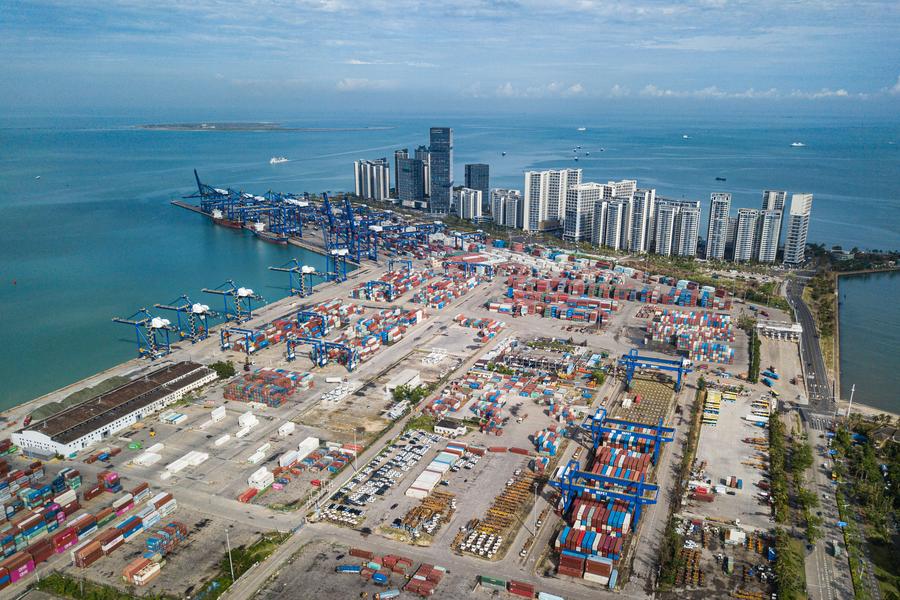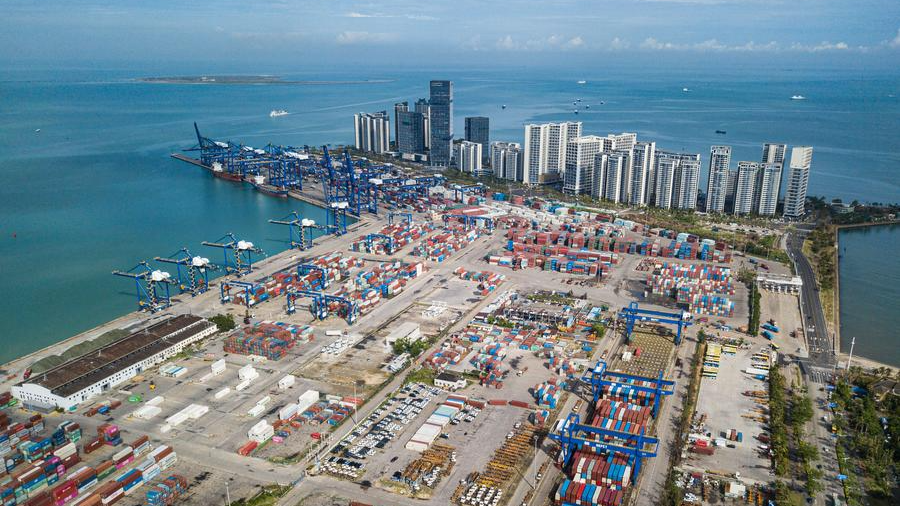
BEIJING, Jan. 9 (Xinhua) -- As the new year starts, Chinese foreign trade companies are zeroing in on new markets, new business patterns, and new products. Supported by government-led initiatives, these companies are racing to seize new opportunities, break new ground, and foster new momentum in foreign trade.
On January 6, machines rumbled in the workshop of Shandong CHINT Cable Co., Ltd., where workers were scrambling to fill an order worth tens of millions of yuan destined for Europe and North America.
"We have received quite a few overseas orders right at the start of the new year," said Zang Huawen, deputy manager of Shandong CHINT Cable Co., Ltd.
He attributed the steady growth in overseas markets to the company's consistent upgrades in equipment and technology, which have allowed it to establish a comprehensive cable product lineup.
At Guangzhou International Port, the blare of a locomotive whistle signaled the departure of Train X8120, loaded with household appliances, LED lighting, clothing, and footwear.
This train marks the first China-Europe freight train dispatched from Guangzhou International Port in 2025 and will traverse a 10,000-kilometer journey to Europe over the course of roughly 15 days.
With the Lunar New Year holiday approaching, business at Guangzhou International Port is expected to reach its peak, stated Ye Jing, deputy chief of the customs supervision section at Guangzhou Station.
Freight orders for the China-Europe freight trains have already been scheduled for the holiday period, according to Ye.
Behind each overseas order are the proactive efforts made by foreign trade companies in expanding overseas markets. In the first 11 months of 2024, China's total import and export value of goods reached 39.79 trillion yuan (about 5.43 trillion U.S. dollars), marking a 4.9 percent year-on-year increase. Overall, foreign trade operations remained stable.
Industry insiders highlight that in 2024, Chinese foreign trade companies were pursuing innovative development, with the overall trade landscape showing a positive trend of quality improvement and stable volume.
Wen Bin, chief economist at China Minsheng Bank, points to a countertrend rebound in exports and projects a full-year growth rate of 5.5 percent in 2024. China's share of global exports has steadily increased, further solidifying its position as a major trading power.
New business patterns such as cross-border e-commerce, overseas warehouses, and market procurement trade have seen robust growth in recent years.
In the first three quarters of 2024, China's cross-border e-commerce imports and exports totaled 1.88 trillion yuan, marking an 11.5 percent year-on-year increase.
Amid rising uncertainties in the global trade landscape, an increasing number of companies are choosing to "go global" through cross-border e-commerce in 2025 and speeding up the development of new momentum in foreign trade.
On the morning of January 1, three container trucks loaded with 46 tractors departed from the factory gate of Shandong Golddafeng Machinery Co., Ltd. The goods will travel by land to Qingdao Port, and from there, be shipped by sea to Kenya. The company's executive stated that the company views cross-border e-commerce platforms as vital bridges to overseas markets. In 2025, the company will continue to seize opportunities presented by these platforms to secure more new orders.
Goodcang, a company specializing in the cross-border e-commerce logistics sector, is set to open new warehouses in 2025, including a warehouse in Seattle and a nearly 30,000-square-meter warehouse in Chicago, with plans to establish more warehouses in new regions across the United States.
Wen stated that new business patterns and models such as cross-border e-commerce, overseas warehouses, market procurement trade, and bonded maintenance are playing an increasingly important role in driving China's foreign trade growth.
Overseas warehouses are critical nodes in cross-border e-commerce, with their role gradually shifting from being simple storage facilities to offering a comprehensive suite of services, including exhibitions, after-sales support, and maintenance for businesses going global.
To date, China has established over 2,500 overseas warehouses, covering an area exceeding 30 million square meters.
In addition to focusing on new business patterns, foreign trade companies are also accelerating their digital and intelligent transformation, updating production structures, and driving the ongoing optimization of their foreign trade product mixes.
Inside the intelligent workshop at China National Heavy Duty Truck Group Co., Ltd. (Sinotruck)'s Laiwu factory, steel plates are fed into unmanned welding lines and once offline, becoming the hoods of the "New Yellow River" heavy-duty trucks.
By developing an intelligent manufacturing platform, the Laiwu factory has reduced its order delivery cycle by 14 percent. It is reported that Sinotruck achieved total vehicle sales of 370,000 units in 2024, including 135,000 heavy-duty trucks exported, marking a new all-time high.
"We are speeding up our intelligent transformation, improving efficiency while consistently refining our product mix, which has earned us recognition in international markets. Currently, the annual production volume of complete vehicles is so extensive that, if lined up end to end, they could stretch from Jinan to Shanghai," said Lyu Tao, a director of Sinotruck's Laiwu factory.
2025 will mark the conclusion of the 14th Five-Year Plan. At the 2024 Central Economic Work Conference, the government underscored the need to expand high-standard opening up while keeping foreign trade and foreign investment stable.
At the start of 2025, local governments in multiple regions are intensifying efforts to explore emerging markets and develop new growth momentum by hosting trade fairs and building platforms to facilitate business trade.
Across multiple regions, a combination of strategies focused on "stabilization, expansion, and adjustment" is being adopted to encourage and support companies to "go global", "dare to take orders", and "secure quality orders". Governments are utilizing every possible measure to help enterprises seize opportunities to go global.
Amid a global trade landscape rife with uncertainties, China has provided solid development support to all parties through close trade connections with various countries, and plays an important role in the global economic recovery, said Zhou Mi, a researcher at the Chinese Academy of International Trade and Economic Cooperation.
In 2025, efforts will further focus on stabilizing the scale of foreign trade and optimizing its structure, aiming to achieve both quality improvement and stable volume in foreign trade, according to Zhou. (Edited by Yang Yifan with Xinhua Silk Road, yangyifan@xinhua.org)




 A single purchase
A single purchase









